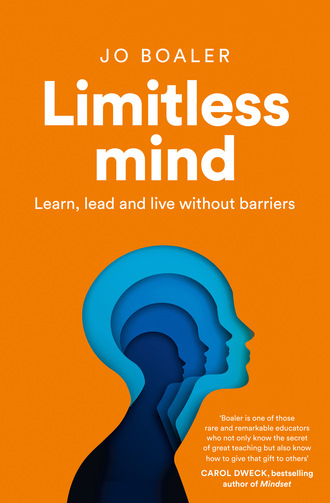
Полная версия
Limitless Mind
Later that summer I received my result—an A. I was fortunate that I had a parent who got the sexist decision the teacher made overturned, and countering his thinking gave me a reason to work especially hard for the exam. The unfortunate impact for me, however, was that I decided I would not go any further in physics. I just did not want any more to do with the man (who was the department chair) or the subject.
Luckily, I did not receive such sexist dissuasion in math, and some of my best and highest-level math teachers and professors were women. I chose to take advanced mathematics instead—I took all the sciences at advanced levels except physics. This is an example of the particularly insidious impact that men like my physics teacher have when they limit pathways based on gender (or race or other characteristics).
A group of young women recently shared with me their experience of approaching their mathematics professor with a question after one of their first classes at a top university. When they asked their question, the professor said it was too basic and they should take a class at the local community college. The women, all African American students, decided at that moment to leave STEM subjects for good. They had experienced enough of these messages and, like many other students before them, they walked away.
Mathematics is, of course, not the only subject that fuels damaging ideas about who can achieve. Art, English, music, sports—all of these are areas where students are initially interested until they begin to struggle and decide they don’t have the right kind of brain (or body). In all cases when students get these damaging ideas, some portion of their future potential is foreclosed. And not only in school. Fixed ideas about potential impact their work lives as well.
I have now talked with many professionals who tell me that before they learned about brain science, they were too nervous to offer ideas in meetings, in case they were wrong, and they were always living in fear of being judged. This is not surprising, as we have grown up in a fixed-brain world that judges everyone on their “smartness.” Many of us have grown up feeling judged for everything, often feeling “not good enough” and worrying about being found out. When people let go of fixed-brain ideas, they become unlocked, especially when they combine this knowledge with other findings from neuroscience that we will explore shortly.
Workers suffer the effects of fixed-brain thinking, but often managers do as well. Managers in companies are just as likely to write off an employee as not having a good brain or being smart enough. If, instead, managers saw the limitless potential of the people they work with, they would talk to them differently and open up opportunities rather than close them down. Instead of deciding that some workers are of limited value, managers might decide that they could be given different opportunities for learning—some may need something to read or study or build (more on this in later chapters). This would change the ways many companies operate and empower many more employers to create important ideas and products.
The first step in living a limitless, unlocked life is to know brains are constantly reorganizing, growing, and changing. Remembering that every day of our lives, we wake up with a changed brain. In every moment of our lives our brains have opportunities to make connections, to strengthen pathways, and to form new pathways. When we face a challenging situation, rather than turn away because of fear of not being good enough, we should dive in, knowing that the situation presents opportunities for brain growth. As we start to recognize the huge implications of the adaptability of our brains, we will start to open our minds, and live differently. The key information that will enable our new pathways and approaches to be enhanced further will be shared in the remaining chapters.
Конец ознакомительного фрагмента.
Текст предоставлен ООО «ЛитРес».
Прочитайте эту книгу целиком, купив полную легальную версию на ЛитРес.
Безопасно оплатить книгу можно банковской картой Visa, MasterCard, Maestro, со счета мобильного телефона, с платежного терминала, в салоне МТС или Связной, через PayPal, WebMoney, Яндекс.Деньги, QIWI Кошелек, бонусными картами или другим удобным Вам способом.

